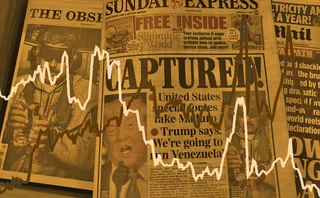
Podcast: McClelland on why you need a good MVA model
Numerix quant presents a model aimed at showing the total cost of a trade

In this episode of Quantcast, our guest is Andrew McClelland, director in the quantitative research team at Numerix in New York.
He co-authored MVA, future IM for client trades and dynamic hedging, one of the two papers published in the August issue of Risk, with Serguei Issakov, senior vice-president in the quant research group at Numerix, and Alexandre Antonov, chief analyst at Danske Bank in Copenhagen.
McClelland talks to us about why it is important for a bank to have an accurate model to estimate the value of margin valuation adjustments (MVA), the cost of funding initial margin (IM). He explains that MVA “is a cost of doing business, a cost of trading, so it is natural that banks are seeking to reflect those costs in their pricing and their valuation”, similar to what happens with other XVAs, such as credit valuation adjustment and funding valuation adjustment. Ignoring it may lead to significant mispricing.
Their paper builds on research published in Risk in 2018, in which the same authors simulate and forecast the required sensitivities of future trade values using algorithmic differentiation.
Here, in response to requests from clients to have a model able to provide the total cost of a trade, including costs of hedging and funding, they extend the previous model to one that takes MVA into account both for the client side and the hedging side of the trade. “If you ignore the hedge side you are ignoring a cost,” McClelland points out.
They apply it to Bermudan swaptions, a suitable financial instrument for showing the performance of their approach.
The conversation then turns to the debate on whether funding costs should be included in the valuation of a trade. Interestingly, after years of intense exchanges of ideas between the two parties, the issue has not been settled yet. Some banks seem to take a more pragmatic approach and charge funding costs to their clients in a bid to make a profit, while others don’t charge them – and so gain a competitive advantage – if they can afford to omit them from the valuation.
Index:
00:00 Intro
01:40 Background on MVA and IM
04:33 Previous research
07:32 The proposed approach
12:34 Why a Bermudan swaption?
17:28 Computational hurdles
18:49 The risks of not computing MVA properly
20:50 The funding cost debate
27:28 Current and future research
To hear the full interview, listen in the player above, or download. Future podcasts in our Quantcast series will be uploaded to Risk.net. You can also visit the main page here to access all tracks, or go to the iTunes store or Google Podcasts to listen and subscribe.
Only users who have a paid subscription or are part of a corporate subscription are able to print or copy content.
To access these options, along with all other subscription benefits, please contact info@risk.net or view our subscription options here: http://subscriptions.risk.net/subscribe
You are currently unable to print this content. Please contact info@risk.net to find out more.
You are currently unable to copy this content. Please contact info@risk.net to find out more.
Copyright Infopro Digital Limited. All rights reserved.
As outlined in our terms and conditions, https://www.infopro-digital.com/terms-and-conditions/subscriptions/ (point 2.4), printing is limited to a single copy.
If you would like to purchase additional rights please email info@risk.net
Copyright Infopro Digital Limited. All rights reserved.
You may share this content using our article tools. As outlined in our terms and conditions, https://www.infopro-digital.com/terms-and-conditions/subscriptions/ (clause 2.4), an Authorised User may only make one copy of the materials for their own personal use. You must also comply with the restrictions in clause 2.5.
If you would like to purchase additional rights please email info@risk.net
More on Markets
Brokers must shift HFT servers after China colocation ban
New exchange guidance drives rush for “proximity colo” in nearby data centres
LatAm FX carry trade shrugs off geopolitical fears
Clients in regional carry positions remain undeterred by US interventions, say dealers
S&P bull run drives interest in reset and lookback hedges
Variable strike put options proved popular alternative hedging format of 2025
US mutual funds slash short euro positions at record pace
Counterparty Radar: Pimco cut $4.6bn of EUR/USD puts in Q3 amid changing stance on dollar direction
Nomura hires new global eFX head
Mark McMillan to oversee e-trading and sales activities in newly created role
Trump’s LatAm gambit spurs FX hedging rush
Venezuela op boosts risk reversals as investors look to protect carry trades
One Trading brings 24/7 equity trading to Europe
Start-up exchange will launch perpetual futures Clob in Q1 after AFM nod
FXGO volumes surge despite fee switch-on
Dealers split on whether levy is behind volume increases across SDPs








